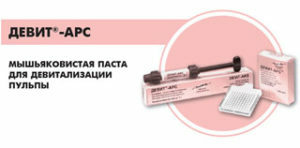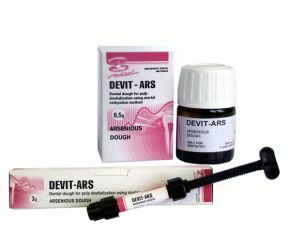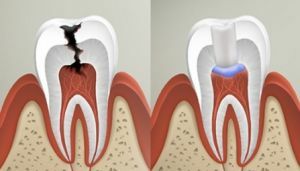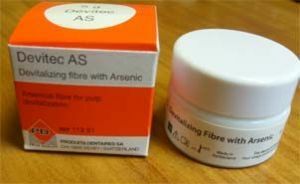 Devit Ars refers to the dental materials used to devitalize the tooth pulp. Its use is justified in the treatment by extirpation.
Devit Ars refers to the dental materials used to devitalize the tooth pulp. Its use is justified in the treatment by extirpation.
After the application of the paste, the vascular-neural bundle dies, which makes it possible to carry out the procedure for cleaning the root canals as painlessly as possible.
Contents of
- Ingredients
- Therapeutic properties
- When used
- How to use
- Special instructions
- Cost and analogues
Features of
The basis of the preparation is 30% arsenic anhydride, which is responsible for necroticizing the fibers of the pulp. In addition to it, Davit Ars includes:
- anesthetic , in which the role of lidocaine hydrochloride, it removes all the pain that occurs during the death of tissues;
- antiseptic eugenol destroys a wide range of pathogens, which contributes to better root canal treatment;
- fibrous filler ;
- pasting agent .
The last two components are responsible for the good plasticity of the material.
Release form The APC-paste, which can be placed in a syringe weighing 3 grams or found in a jar weighing 6.5 grams, also includes instructions and carton packs.
In addition, the material can be supplied in the form of doses of 4 mg. In one package there are 100 pcs.
Therapeutic properties of
Arsenic refers to potent poisons. When a paste containing arsenious anhydride is applied, the coronal pulp changes first. 
The structure of the blood vessels passing through it is disturbed. Their walls are destroyed, which is accompanied by a sharp bleeding. After a while, the destruction affects other pulpal tissues.
In addition to blood vessels, the nerve fiber undergoes changes. First it is reborn, and then perishes.
The degree of damage depends on the duration of the drug application. The longer it acts, the stronger the effect will be.
The nature of the manifestations will be the same in any case. The pulp will mummify and die.
When using
The drug is used in the following cases:
- spread of carious process through thinned dentin;
- infection of pulp with traumatic injuries of the crown part of the tooth with violation of the integrity of the pulp chamber;
- opening of the pulp chamber in the process of preparation of a deep carious cavity;
- for endodontic treatment before prosthetics.
Method of using
The use of the paste consists of a number of steps:
- Conduction of a conductive anesthesia in the area of the affected tooth.
- Treatment of carious cavity.
- Removal of softened dentin. At this stage, you can use excavators or hard-alloy spherical burs of small diameter, mounted on the micromotor.

Paste under the insulating temporary seal
- The volume of the opened pulp should not exceed the size of the horn.
- A small amount of material is applied to the exposed pulp with a probe. The optimal dosage depends on the number of roots. For single-root teeth, 4 mg will suffice, and for two- and three-root teeth, 8 mg.
- A small cotton ball is placed on top of the paste.
- The cavity is then closed with a temporary filling material.
- The duration of the application depends on the number of roots and the severity of pain. The pulp in the incisors, canines and premolars dies after 24 hours. In large molars this time is increased to 48 hours.
- After 1-2 days, the root canals are treated, sealed, the crown part of the tooth is restored.
Special instructions
The maximum period for which you can leave the APV in the tooth is 72 hours. After 3 days, irreversible changes occur, affecting the surrounding gingival tissue and periodontium. In this case, the material is immediately removed from the carious cavity, and the channels are washed.
Universal antidote for arsenic is Uniothiol.
To avoid negative consequences, the patient needs to be warned about the importance of a timely visit at a set time.
If it has been found that the material has been drained, it is also necessary to consult a doctor immediately. The use of paste is contraindicated in patients with allergic reactions to the components of the drug.
Cost and analogues
The price of a single syringe Devit ARS can vary from 400 to 600 rubles. 
The following material analogues can be found on the market:
- Devitek;
- Devit-P;
- Arsenik;
- Arsedent.
